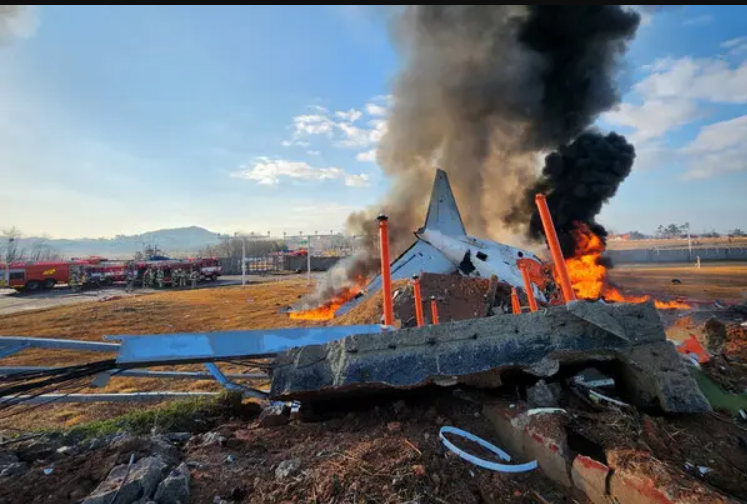
On December 29, 2024, a tragic aviation accident occurred at Muan International Airport in South Korea, involving Jeju Air Flight 2216. The Boeing 737-800 aircraft, carrying 175 passengers and six crew members, was en route from Bangkok’s Suvarnabhumi Airport to Muan. The flight departed Bangkok at 2:11 a.m. local time and was scheduled to land in Muan after a routine journey.
At approximately 9:07 a.m. local time, during its landing approach at Muan International Airport, the aircraft encountered critical issues. Preliminary reports suggest that the front landing gear failed to deploy, forcing the pilots to attempt a belly landing. As the plane touched down without its landing gear, it skidded along the runway, veered off course, and collided with a concrete barrier. The impact resulted in a catastrophic explosion, engulfing the aircraft in flames.
Emergency response teams were promptly dispatched to the scene. Over 1,500 personnel, including firefighters, police officers, and medical staff, were involved in the rescue operations. Despite their swift efforts, the intensity of the fire and the extent of the wreckage posed significant challenges. Tragically, at least 124 individuals lost their lives in the accident. Among the survivors were two crew members who were rescued from the tail section of the aircraft; they sustained severe injuries and were transported to a nearby hospital for treatment.
The exact cause of the landing gear malfunction remains under investigation. Initial theories suggest that a bird strike during the landing approach may have compromised the aircraft’s systems, leading to the failure of the landing gear deployment. Additionally, adverse weather conditions at the time may have exacerbated the situation. The aircraft’s black box has been recovered and is expected to provide crucial data to help determine the sequence of events leading up to the crash.
Jeju Air, a South Korean low-cost carrier, has expressed profound condolences to the families of the victims. In a public statement, the airline pledged full cooperation with aviation authorities to investigate the incident thoroughly and implement measures to prevent such tragedies in the future. This accident marks the deadliest in South Korea’s aviation history since the Korean Air Flight 801 disaster in 1997.
In the wake of the crash, all flights at Muan International Airport have been suspended until further notice. South Korea’s acting President, Choi Sang-mok, has declared the area a special disaster zone, mobilizing national resources to support recovery efforts and assist the affected families. A temporary morgue has been established to manage the identification of victims, and counseling services are being offered to grieving relatives.
The international aviation community has expressed solidarity with South Korea during this difficult time. Boeing, the manufacturer of the 737-800 aircraft involved in the crash, has stated that it is providing technical assistance to the investigation. Aviation safety experts emphasize the importance of a meticulous inquiry to uncover any mechanical failures, human errors, or external factors that may have contributed to the disaster.
As the investigation continues, authorities are urging the public and media to refrain from speculation and to await official reports. The focus remains on supporting the victims’ families, understanding the cause of the accident, and enhancing aviation safety protocols to prevent future occurrences. This tragedy serves as a somber reminder of the critical importance of rigorous safety measures and the need for continuous advancements in aviation technology and training.






